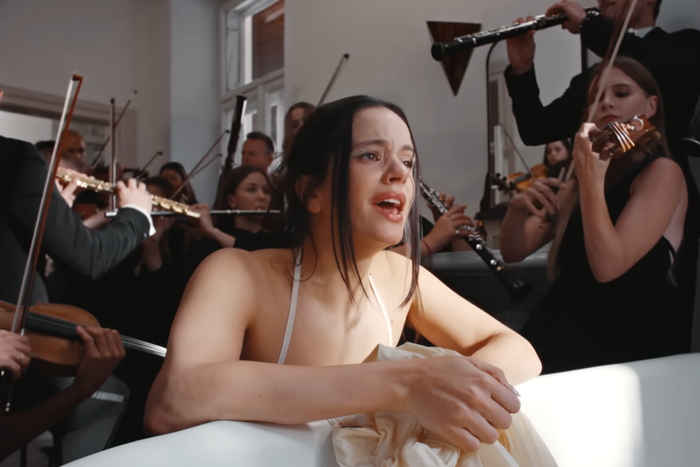
Motomami’s “Saoko” stressed that she was a transformer; Lux replaces everything under its predecessor’s hood without losing any of the horsepower.
Photo: ROSALÍA via YouTube
The patron saint Rosalia of Palermo was a preteen Sicilian girl from a well-to-do family in the 1100s who, facing an arranged marriage, renounced her wealth and cloistered herself in nearby mountain caves to pray for the rest of her life. Catalonia’s premier pop star, Rosalía, invokes her namesake’s defiantly shaven head in her new single, “Reliquia.” Following a broken engagement with the Puerto Rican singer-songwriter Rauw Alejandro in 2023, Rosalía compares her incremental loss of innocence to a crumbling religious figurine losing hands, eyes, and more to time and travel. Her heart, the second verse advises, has never been her own, and her fate is to give endlessly of herself. Is Rosalía singing about desire, fame, or faith? Was this song for Rauw, for us ear-hustlers, or for God?
These wires cross on her stunning fourth album, Lux, whose artwork depicts the 33-year-old singer in a white nun’s habit and a straitjacket-ish top. The writing dances on a knife-edge as religious piety and saintly delusion rub elbows. The music booms and swells like it was meant to be experienced in a cathedral, tense strings and choral asides replacing the equatorial pop of past hits like 2019’s “Con Altura” and 2022’s “Saoko.” Lux’s lead single, “Berghain,” feeds lyrics that grasp for the starry-eyed curtness of the Bible’s Song of Solomon — “His love is my love / His blood is my blood” — to a choir to sing in stabs of percussive German, like the kind of classical work that enjoys a second life in horror-film soundtracks. It’s all several ticks too horny to pass as humdrum Catholic fixation on the agony of the saints. The ideological provocations of Madonna (Ciccone) iconography and the esoteric execution of Björk songs meet (again) in Lux’s palette of fixations.
This is a very loud left turn, but everything is with Rosalía. Her third album, 2022’s Motomami, is Lux’s tonal inverse: That album’s graffiti-splashed, near-nude, biker-babe pinup artwork broadcasted an affinity for the culture of Caribbean and coastal American inner cities. Rosalía’s collaboration with notable reggaeton producers and artists got her international platinum certifications but also sparked some apprehension about how quickly a Spanish singer found purchase in Afro-Latino musical traditions. After all, we met her as an acclaimed flamenco prodigy whose 2018 sophomore album, El mal querer, was a baccalaureate project at the prestigious Catalonia College of Music. Her sudden pivot from folk-music historicity to pop ubiquity was breathtaking. Just as David Bowie enjoyed praise for dabbling in Black music on 1975’s Young Americans while his backup singer Luther Vandross took years to accrue the same respect, by which point Bowie was musically miles away, the Catalan singer who took over urbano now investigates opera and classical music.
Lux weaponizes people’s impressions of Rosalía as an art-school culture vulture. She’s singing in 13 languages about cities all over the planet, informed by the plights of women over millennia. With the London Symphony Orchestra in tow, she makes a play to fuse commercial and classical art pop that’s a product of immense research and also a by-now-puckish aversion to serving us what we expect. Yes, it all screams, I would like to sample all of the stories and experiences available to me in this lifetime. Lux makes a potent argument for letting Rosalía tear through the annals of history and for shattering our limited view of pop as merely bubbly party music. Motomami’s “Saoko” stressed that she was a transformer; Lux replaces everything under its predecessor’s hood without losing any of the horsepower.
Straight out of the gate, “Sexo, Violencia, y Llantas” introduces themes of orchestral pomp and crisis-level metaphysical pondering: “How nice it’d be / To come from this earth / Go to heaven / And come back to the earth,” Rosalía croons in Spanish as a host of strings and singers swarm her. This climax is steeped in ancient psalms and hymns but also the neat, museumlike minimalism of pop-culture descendants like Ye’s Sunday Service Choir operas. It’s a reminder that church music can be very avant-garde. Noah Goldstein, engineer on My Beautiful Dark Twisted Fantasy and Yeezus and co-producer on Motomami and Lux, steers this album’s orchestral leanings in stadium-friendly directions. But Björk’s early-aughts curveball Medulla, which largely and sometimes quite combatively consists of countless distortions of the human voice, is another analog. Lux goes out of its way to find colorful applications for its mountain of languages, instruments, and vocalists. The scrape of guttural strings renders “Porcelana” — where the literal preciousness of china is employed to convey a sense of brokenness — all the more precarious, its soft vocals buffeted by a hail of jagged-edged treble and blunt bass. “Porcelana” is as effective as the barbwire death trap in Dario Argento’s Suspiria at communicating the idea that there’s no way this person escapes the scene unscathed. To love is to run a gauntlet. But on the physical edition of Lux, “Jeanne” and “Novia Robot (Pa Lo Mismo)” wring sweetness from the same stringed commotion that made “Porcelana” and “Berghain” unsettling and almost suffocating several tracks earlier.
Not content to knock you down by rearranging her songwriting with radically different parts and references than querer or Motomami dared, Rosalía works every bit as intently with shock and humor. “Berghain,” where Björk sings about claiming “divine intervention,” is named after the legendary queer club in Germany once famed for having a regular customer known as the Piss Goblin. “Novia Robot,” the most traditional commercial fare this round, takes the form of a typical Rosalía hit record to advance its narrative conceit: It’s an ad for a futuristic sex doll informing men that they can simulate intimacy with all the women of the world. Of course such a thing would be catchy and multilingual. “Robot” pokes at the tone of real-world AI-porn advertising and the lover who’d prefer an automaton. But the eyebrow raiser is a coda that seems to assume this machine would see a human boyfriend as deity, dressing up to get “guapa para Dios (hot for God).” “Robot” follows “Jeanne,” where a captured Joan of Arc awaiting death claims annihilation is the highest act of love. Elsewhere, “La Yugular” ponders ideas about the soul and afterlife gleaned from studying Islam, toasting a love the protagonist would “demolish hell” to defend.
Surveying thousands of years of history, Rosalía explores the seen and unforeseen costs of devotion. Her Palermitan predecessor turned down medieval luxury for monastic seclusion; Jeanne and the sex bot sacrifice their bodies to wildly opposing visions of altruism. The singer wonders what this means for her professional and love lives, what pieces of herself greatness begs her to part with, by turns jestful and earnest. Rosalía is listening to God, the disarmingly sweet “Sauvignon Blanc” says, and throwing out her Jimmy Choos. Lux blesses a year of tepid odes to wars between faith and the flesh — consider the sober Sunday-morning regret of Morgan Wallen’s I’m the Problem and the jealous angels of Alex Warren’s “Ordinary” just one last time — with its zestiest trip to that crossroads.
A less charitable reading of Lux’s scandalously sensuous and often nakedly liturgical pivot might see the whole thing as a rejection of Rauw Alejandro so thorough that Rosalía has even moved on from the brash trunk-rattlers that might remind her of him. “She’s so heartbroken, she’s taken up blasphemy,” one could reductively quip. One of Lux’s most devastating tracks, the baroque and circuslike “La Perla,” skewers him with a term that refers to a shoreline neighborhood in historic San Juan and hews closely to the Italian word for “dick.” The translation provided with the album offers the surface definition of “perla,” i.e., “pearl,” implying that the chorus — “He’s a pearl / He can’t be trusted” — is calling its target a tiny, hard thing. But Lux itches to show its work. It’s hard to imagine someone who sought insight from native speakers about lyrics in Mandarin, Hebrew, Ukrainian, and Arabic accidentally stumbling onto this stacked entendre. Is Lux fishing for adverse reactions with tracks like “Mio Christo,” the opera aria sung in Italian that jostles confusingly between admiration of a gem-encrusted Jesus piece and a friend Rosalía is on the outs with? Is placing Björk’s invocation of divinity right before the singer-songwriter and noise DJ Yves Tumor’s call to loveless sex on “Berghain” just a game to get a rise out of the audience? Or does Lux ask us to crane our necks to appreciate base human longing that presents in ecstatic and horrific manifestations, in the hunger for all sorts of holy and unsavory connections?
Several interpretations can be true at once. Rosalía can have a sincere desire to know the world via the arts and a sixth sense for what sets people off. The careful, classically trained disruptor who rankled flamenco purists and then urbano aficionados with her adoption and reworking of genre staples loves to be doing something people don’t feel like she would or should do. A stint as chart supernova working in one of the most lucrative, accessible corners of popular music was only going to excite the kind of thinker who views an album as an excuse to grow an entirely new skill set for so long. Rosalía insists upon a challenge where none was required. She would totally decamp to a mountain hideaway like Sicily’s beloved recluse if it came with a library and studio.
Source link

